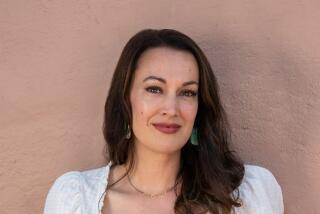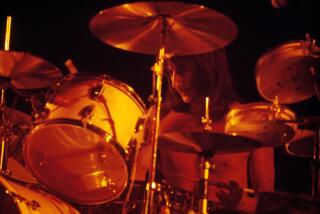Where the Mild Things Are : JudyBats Defy Rock’s Raucousness in Docile Show at Coach House
- Share via
SAN JUAN CAPISTRANO — The JudyBats may be the anti-Nirvana. In a show that included a mocking snippet of “Smells Like Teen Spirit,” these fastidious college-rockers from Tennessee seemed bent on defying the ripping, ranting and roaring style that took Seattle’s alternative-grunge-rock darlings to the top.
Unfortunately, the JudyBats’ defiance of wildness Tuesday night at the Coach House made for an evening of mildness that exuded all the raucous energy of a sherry-sipping graduate Lit seminar. But it at least manifested some of the genteel braininess of such a gathering and offered tastes from a decanter full of savory melodies.
Subtlety and restraint were the JudyBats’ watchwords. In fact, singer Jeff Heiskell was so restrained that he barely moved his feet, and only occasionally his hands, during an 80-minute performance. This wasn’t a question of inhibition (Heiskell didn’t seem the bashful sort as hetossed out quips and sexual barbs between songs), and it definitely wasn’t an example of the trance-like, paralytic intensity some rockers attain in performance (the JudyBats’ music is hardly that riveting, based as it is in a breezy blend of wistfulness and light irony concerning the emotional upsets of post-adolescent romance and identity-searching). Instead, Heiskell’s immobility came off as a deliberate refusal to bow to the convention that rocking ought to be a physical sport.
The other band members were just as stolid, except for Johnny Sughrue, the little guitarist who bounced and bobbed around the stage, flinging his long hair about all the while. But even Sughrue’s lively display ran counter to rock’s athletic stage conventions: He was wielding that least aggressive of tools, an acoustic guitar, so there was no sonic throw weight to back up his enthusiasm for the physical. Working in a subordinate role, Sughrue came off as a likable but minor sideshow to the careful business at hand.
With their meticulous playing, the JudyBats were able to neatly and cleanly reproduce a selection of songs from their two albums, “Native Son” and “Down in the Shacks Where the Satellite Dishes Grow.” Ed Winters dabbed on all manner of tasteful, unassuming and fang-less electric guitar fills and filigrees; Peggy Hambright’s keyboards lightly colored in spaces. Heiskell sang sweetly, capturing some of the comic melancholy of Morrissey, minus the histrionics. He also incorporated half-spoken bits of dialogue delivered in a dryly humorous, theatrical way that recalled Stan Ridgway.
China-shop rock doesn’t have to be bull (see the fine, delicate works of the late British folk-rocker Nick Drake or the disbanded Australian group the Go-Betweens). But if you take away toughness, fire, physicality and extroversion from a rock concert, you’d better be able to compensate with depth of feeling. Too often, the JudyBats fell short, offering glistening performances without emotional pull (a concluding attempt at a slumming rave-up, “All I Wanna Do Is (expletive) Your Hair,” came off as a too-little, too-late, too-forced attempt to play rough).
The JudyBats did connect on two strong ballads. “When Things Get Slow Around Here” was a sad, affecting reverie about loneliness and loss that featured Hambright’s sighing violin and Heiskell’s most intimate singing (for once, standing stock-still didn’t seem like a manifestation of inappropriate effect). “Lullaby--Weren’t We Wild” offered a gorgeous, haunting melody reminiscent of the Byrds’ “You Showed Me.” Then it broke into a driving coda in which the JudyBats achieved, for a change, a fine, unfettered rock intensity. The up-tempo sequence closely resembled a passage from “Aquarius,” that old nugget from the rock musical, “Hair.” Another highlight was a new, unrecorded song, “Go,” which soared with open-hearted romanticism.
A cover of an obscure ‘60s gem, the Kinks’ “Animal Farm,” underscored both the JudyBats’ refined taste, and the meagerness of their tidy and austere performing approach. Ray Davies’ original is a remarkable combination of escapist daydreaming and a contrasting, deeply poignant recognition of life’s harshness.
Listening to it, one imagined the extravagant showman Davies, with his customary tipsy warmth and his vaudevillian’s love of physical display in performance, reaching out to embrace the audience with the song and turn it into an act of mutual support in the face of “this world (that’s) big and wild and half insane.” The JudyBats achieved no such connection with their thin, washed-out rendition; Heiskell just didn’t have the presence and vitality to pull it off. In the end, rock music that fails to move the performers physically stands little chance of moving a listener in any way at all.
The show also featured the West Coast debut of the Original Sins, a Pennsylvania band that has been profitably mining ‘60s garage-rock sources since 1987. Bandleader J.T. (John Terlesky) isn’t a gifted singer, but his pop instincts are first-rate. If his scratchy voice couldn’t smoothly negotiate the melodic curves his songs took during a 40-minute opening set, the chubby singer did his rough best to fill in with yowls and growls that at least served the emotions involved. Many Original Sins songs depict characters who are all-too aware that life is probably a fundamentally disappointing, hurt-filled business, yet who refuse to succumb quietly to that knowledge. They strain, if not for uplift, at least for an affirmation of energy and the possibility of transcendent moments when everything does seem right.
The 12-song set focused on pop-oriented material from the Original Sins’ delightful new album, “Move,” and de-emphasized a heavier and noisier garage-psychedelic side that pays homage to such bands as the Stooges and the Seeds.
The decision to stick with pop stuff made for a neater fit with the JudyBats, but a raver or two wouldn’t have hurt. J.T.’s raucous, feedback-drenched solo guitar work cropped up only fleetingly. Instead, he concentrated on jangly rhythms while Dan McKinney’s bright, warm organ work dominated.
Although the Original Sins were clearly nervous and tentative as they opened new performing territory in front of an audience unacquainted with them, strong material and solid musicianship carried them through an appealing set. Here’s hoping they’ll be regular visitors from now on.
Sandwiched between two very catchy bands, the melodic shortcomings of the local rock group Mytuswell were placed in stark relief. Songs with vague heavy-rock roots in the ‘60s (Ten Years After, maybe?) rolled along, with one sounding pretty much like another. But if the Mission Viejo band’s song craft and vocals need a lot of work (the band also needs to figure out why it needs three guitarists if it’s not going to go for guitar interplay), it does have one definite strong point.
Drummer Danny Grimes was a striking player who, in the absence of anything else distinctive, became a show in himself with an impressive display of force, precision and deft variation. This grass-roots musician has the chops of a pro; maybe Mytuswell can grow from the foundation he provides.
More to Read
The biggest entertainment stories
Get our big stories about Hollywood, film, television, music, arts, culture and more right in your inbox as soon as they publish.
You may occasionally receive promotional content from the Los Angeles Times.











